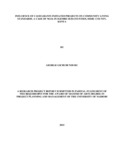| dc.description | Developing countries all over the world are giving greater attention to social protection. These
programmes include social insurance, social assistance (cash and in-kind transfers) and active
labour market programs. Amongst the different types cash transfer has been identified as the
most popular social protection tool and as such it has been identified as the most successful tool
in poverty eradication. Most of evaluations done were done on cash transferred and its influence
on households and not on the whole project of cash transfer. It is of such that this study was
geared to assess the influence of the cash grant initiated projects on the community living
standards. The objective of the study was to determine the influence of demographic factors, type
of businesses established and skills training acquired through the cash grant initiated projects on
community’s living standards. The study was limited to the Igembe Sub-Counties of Meru
County and to the cash grants issued before January 2014. It was also limited to two CBOs and
one FBO within the 3 Sub-Counties. Descriptive research design was used. The target population
was 390 beneficiaries drawn from the three organizations. The sample size which was 117
respondents was established which was 30 percent of the total population. This is as advanced by
Kothari (2009) that 10 – 30 percent is a good representation of the target population. Stratified
sampling method was employed where each of the organization was a stratum. Structured
questionnaires were used to collect the data which was later analyzed through descriptive
statistics which included frequencies and percentages. The findings of the study includes:
Majority of the respondents were women 77 percent and were of primary education. Majority
were aged between 35 – 60 years with 4.5 percent being child-headed household and 18.1
percent of the households were headed by people over the age of 61 years. Majority of the
respondents had received skills training once and only 3.6 percent had received training on
entrepreneurship. Majority of the respondents indicated that the training was effective and had
highly influenced their living standards. Even though the region is well known for the Miraa
business only 7.3 percent of the respondent invested their money in Miraa trade. 55.5 percent of
the respondents had invested in small business/trade and majority of these had begun Food
Kiosks. 57.3 percent of the respondents were earning over shillings 3,000 per month; this is an
estimate of 1USD per day. 86.4 percent of the respondents were consuming over shillings 5,000
per month an indication that majority of the respondents consumes more than their monthly
income. The study concludes that the cash grant initiated projects are geared towards
beneficiaries initiating IGAs to improve their income and this it has achieved; therefore the cash
initiated project influences the community living standards. The study recommends that due to
limited education background of the beneficiaries more skills training are required to improve
the beneficiary’s productivity. Training on entrepreneurship which challenges individual
creativity, innovation and to realize the business potential around them is essential. Due to the
identified child-headed households and elderly (grandparents) care givers, different mode of cash
grant provision is required; a one off cash grant provided by organization may not be sufficient
because these group may not manage to venture into IGAs, and therefore a monthly cash transfer
is required for this group. | en_US |

